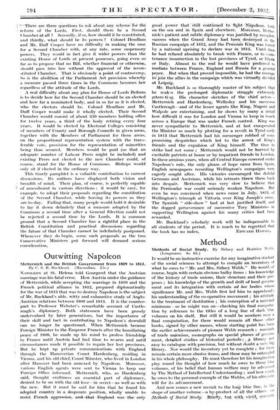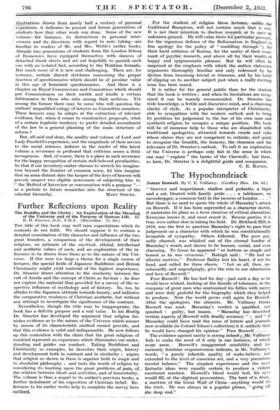Method
Methods of Social Study. By Sidney and Beatrice Webb. (Longmans. 8s. 6d.) IT would be an instructive exercise for any imaginative student of the social sciences to attempt to compile an inventory of what he owes to " Mr. and Mrs. Sidney Webb." He would, of course, begin with certain obvious bulky items : his knowledge of the history of trade unions, their structure and their pur- poses ; his knowledge of the growth and drift of local govern- ment and its integration with certain ad hoc bodies whose significance Mr. and Mrs. Webb first led him to apprehend ; his understanding of the co-operative movement ; his attitude to the treatment of destitution ; his conception of a national minimum—so he might run on—checking his final computa- tion by reference to the titles of a long line of dark blue volumes on his shelf. But still it would be nowhere near a final computation, for there would remain all those other books, signed by other names, whose starting point has been the earlier achievements of pioneer Webb research : manuals of trade unionism, monographs en special phases of govern- ment, detailed sttidies of historical period.. "a library not easy to catalogue with precision, but without doubt a very big library. Nor would the inventory yet be complete ; for there remain certain more elusise items, and these may be entangled in his whole philosophy. He must therefore let his imagination play round the thought of how much he owes to those blue volumes, of his belief that human welfare may be advanced by The Method of Intellectual Understanding ; and how much he owes to the personal example of the Webbs, of his altruistic
will for its advancement. . -
And now comes a new recruit to the lorik blue line, in the shape of another .volume--a by-product of all the others—on Methods of Soda: Study: rfiriefly; h_qt: witk. Vivid concrete
illpitrations drawn from nearly half a century of personal experience, it indicates to present and future generations of students how that other work was done. Some of the new volume:—fOr 'instance, its instruction's to .personal inter- 1 viewers and its directions with regard to note taking—are familiar to readers of Mr. and Mrs. Webb's earlier books. Already two generations of students from the London School of Economics have equipped themselves with sheaves of detached blank sheets and set out hopefully to garnish each one with an isolated fact, according to the Webbian formula. But much more of it is new and challenging. There are, for instance, certain* shrewd strictures concerning the proper function of questionnaires which should be of peculiar value in this age of luxuriant questionnaires. And there is a chapter on Royal Commissions and Committees which should put Commissioners on their mettle and kindle a certain dubiousness in those who rake among their archives. Yet among the former there may be some who will question the authors' unqualified eulogy of lawyers as Committee members. These lawyers may be adepts at the extraction of relevant evidence, but, when it comes to constructive proposals, what of a certain legalistic tendency to prefer detailed amendment of the law to a general planning of the main structure of reform ?
But, all said and done, the quality and volume of Lord and Lady Passfield's experience, and the magnitude of their service to the social sciences, induces in the reader of this latest volume a reverence so profound that criticism seems a little incongruous. And, of course, there is a place in such reverence for the happy recognition of certain well-beloved peculiarities. So that if our inventory-maker chooses to stretch his 'imagina- tion beyond the frontier of common sense, let him imagine that on some distant date the keeper-of the keys-of-heaven will :gravely suspect two eligible newcomers of subjecting him to the Method of Interview or conversation with a purpose "— as a prelude to future researches into the structure of the











































 Previous page
Previous page